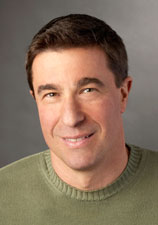JON BROOKS: So what are politicians like?
SCOTT SHAFER: Well in a way that's like asking what are teachers like. There are a lot of different kinds of politicians, and they're different at the local level than when they make their way up the political ladder and run for the legislature and congress or the senate. As they climb that ladder, I think their egos get bigger, their sense of invulnerability sometimes gets bigger, the demands on their fundraising gets bigger. Politics I think does change people.
Nowadays with term limits, you have so much churning -- people are only there for a relatively short amount of time. So you've got more people going into politics from professions like teaching, nursing, high tech, from all walks of life . I think that makes for more people who don't necessarily go into politics to become career politicians. Though they may become career politicians.
But I do think people by and large go into politics for the right reasons, in that they want to do good things, and they like the idea of public service. I don't think you run for the city council or school board because you want to wield power. But those jobs do become stepping stones.
JON BROOKS: Not knowing any politicians and not knowing anyone who's worked with them, besides you, I've always had this nagging question: Do they really care? How prominent is policy as opposed to just getting to that next rung? I have one family member, and her view is politicians don't mean anything they say and they only want your vote. Is that completely unfair?
SCOTT SHAFER: Yeah pretty much, though I think I understand where that comes from. I remember my grandfather saying 'they're all crooks and shysters.' That notion that politicians are corrupt – it's a not a new one. And I think there are things nowadays that feed the cynicism, in particular the fundraising, which makes for a lot of compromises.
But I think there are a lot of good people who go into politics. I've worked for a politician– the former mayor of San Francisco, Art Agnos, who was very passionate about policy. He was a former social worker who cared deeply about homelessness, health care, gay and lesbian rights back before it was a mainstream idea. And I think to his detriment he cared about policy above politics. He ended up losing reelection in 1991 in large measure because he took what he felt was a principled but unpopular position on homelessness. I'm not saying that Agnos was right or wrong, but he certainly cared deeply about policy.
I've also worked for other politicians who cared much more about getting reelected and climbing the ladder. One former state legislator told me that back in the 1980s, his seatmate in the Assembly used to keep a little notebook in his pocket, which he pulled out after every vote so he could keep track of who to hit up for campaign donations based on how he voted. That former assemblyman climbed the ladder, eventually winning statewide office.
So there are all kinds of people. But I think that politicians who put their re-election ahead of everything else are more willing to make compromises.
JON BROOKS: Today we’ve got the Tea party on the right and the Occupy movement on the left. Why do you think people seem to be so disaffected from the political system nowadays?
SCOTT SHAFER: Part of it is the economy and that you have so many people hurting. If you think about it, it's been a very difficult 10 years or more for the U.S., going all the way back to the 2000 election, which some people felt that was decided in a very political manner by the U.S. Supreme Court. Then you had 9/11, and since then there have been very few moments when people rallied around something the U.S. has done -- one that comes to mind is the killing of Osama bin Laden. It's been years of economic dislocation and fear about the future. I think whenever you have an economic situation like that, as in the Great Depression where you saw communism become more popular in parts of the U.S., people turn to more extreme ideas.
And I think also watching Congress in particular but also the state legislature, and the inability to come together to get some very basic things done. Like extending unemployment benefits – I think people felt that was a no-brainer. Or when they see the federal government coming to the brink over raising the debt ceiling, which congress has done forever for both Democratic and Republican presidents, and to bring it to the point where the credit rating of the government gets lowered, I think people become fed up.
I think people also feel because of the money and corporate influence in politics, as well as influence by other interests like labor unions, that the average person gets forgotten, and no matter who is there, either as governor or president, that somehow they're going to get left out of the equation. And there's some reason to justify that point of view.
JON BROOKS: Why did you leave political consulting?
SCOTT SHAFER: Because it was political consulting.
There are people who are really cut out for that and are really good at it. But I'm much more suited temperamentally to being a reporter. Of course I have my opinion and point of view about things, but when I interview somebody who I disagree with on one side of an issue, it's very easy for me to understand where they're coming from. I like letting them have the time to say what their point of view is and explain it.
When you're in politics, it's all about winning, about spinning the media, the daily talking points, undermining your opponents. It's just a different mindset and one I was not particularly suited to.
